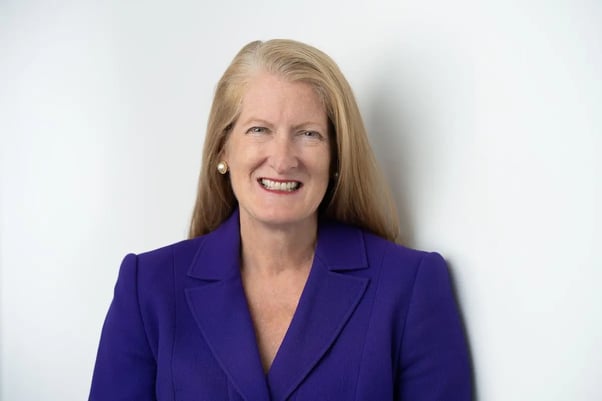Kate Grussing CBE, managing director of Sapphire Partners
In our regular #MyFirstMcJob series, big fish remember when they were still small fry

Hi, Kate! Who are you and what do you do?
I'm Kate Grussing. I'm the managing director of Sapphire Partners, a search firm that's been around for 18 years. We're award-winning and we like complex, challenging, meaty, difficult searches for senior leaders, for board and executive roles.
What was your #MyFirstMcJob?
Working at a lifeguard in Maryland, about an hour west of Washington DC, in the summers through school and the beginning of my summers in university.
How long were you a lifeguard for?
I started when I was just 16 and I probably did it for five summers. It would get quite hot and humid and were usually pretty crowded because no one had private pools.
How did you get that job?
I swam on the swim team. I wasn't an Olympic level swimmer, but I had a keen work ethic and I saw that you could take a course in lifesaving. There weren’t a lot of jobs you could applying for when you were 15, so that was just one that I could.
What did you have to do?
A lot of the humdrum stuff: checking the chlorine and salination levels, monitoring the water pressure, checking the bathrooms and changing rooms to make sure there weren't too many wet nappies left in the wrong places. Then checking people had signed in, had their card or had paid their visitors fee. The stressful part was the sitting in the lifeguard chair trying to watch everyone from the toddlers (who didn't know how to swim) to the teenagers who thought they were cool and could do back flips off the diving boards, and everything in between.
What were the perks of the job?
The main perk was the suntan. There was a real feeling of responsibility, like you were doing something important.
Did you have to save anyone from drowning?
I was lucky I never had to save anyone. I did many practice saves where a burly lifeguard in their 20s or 30s would make themselves as difficult to get out of the water as possible. But it was relatively uneventful. It could be easy to fall asleep in the chair if it was really hot and sunny. You were meant to change chairs every 20 minutes but sometimes you would be in a chair for an hour or more at a time.
What skills did you learn as a lifeguard that you still use today?
Having an extra sense – observing, watching and listening. In my executive search work, I sit on not-for-profit boards where I observe the things that aren't said as much as the things that are said. You can imagine someone screaming for help if they're drowning. It scarily can be quite the opposite – there's no sound.
Are you still in contact with anyone you worked with?
Sadly I am not, but I still love to swim and think the role of a lifeguard is really important. The ability to know how to swim is an important human right (and not enough people have access to affordable swimming lessons). I recently led a search where we found a board member for the Royal National Lifeboat Institute. The RNLI does a lot to promote the awareness of drowning from an immigration standpoint. I worry that not enough people realise the really important role that the RNLI plays.
Why is alumni important to you?
I’ve had the privilege of working at organisations that are really good at managing their alumni. I've also had the missed opportunity of working at organisations where they didn't pay any attention to their alumni. That’s why I’m such a big fan of EnterpriseAlumni. I'm a big fan of founder and CEO, Emma Sinclair. She's a great leader. I'm also an angel investor in EnterpriseAlumni, so I naturally want to see the company be successful because I believe in its strategy, vision and team.
What would happen if you went back and did a shift being a lifeguard today?
I'd probably be a much better lifeguard. I'm sure I would be better at wearing sunscreen, and I definitely wouldn’t wear a bikini anymore. Now I have a lot more empathy as a grown-up, I’d want to help coach the young mothers who aren't letting their kids even try to swim as well as the teenagers who think they're impervious to danger.
If you could go back in time to that point in your life and give yourself one piece of advice, what would you say?
Don't underestimate the benefit of just showing up! Whether it's going to a networking event or preventing an accident from happening. A lot of people's career opportunities come from being in the right place at the right time. I'd say that's true of my lifeguard years too.

